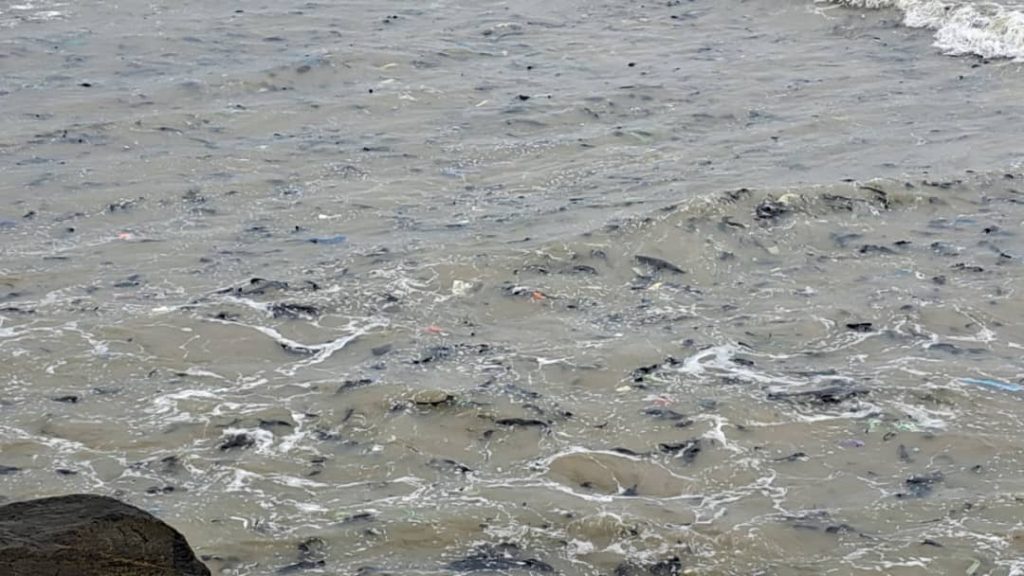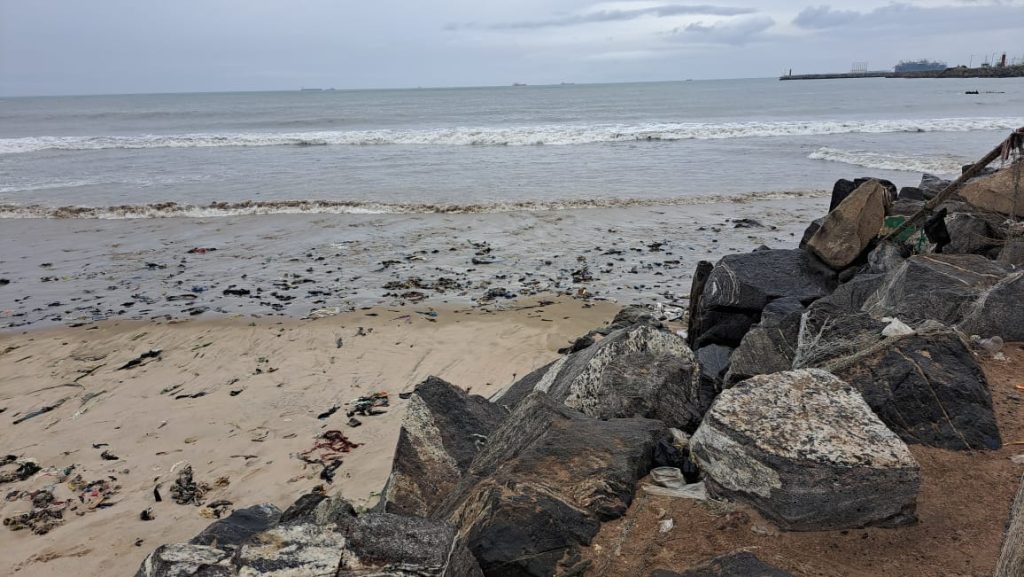A GNA Feature by Laudia Sawer
Tema, July 31, GNA-At first glance, it looks like some mudfish swimming in an aquaculture farm are coming to the surface of the water to take their share of feed thrown into the water, but a closer look at the sea water heading towards the shore brings the reality home.
Plastic waste, mostly made up of black polythene bags, sachet rubber, and empty bottles, rushed afloat with every sea wave that rolled towards the canoe beach at Tema Newtown.
This reality of the amount of plastic hit the Ghana News Agency reporter on board the Ghana Navy Ship (GNS) Chemle with course mates as part of practical lessons for the 15th Maritime Security and Transnational Organized Crime (MSTOC) programme organized by the Kofi Annan Peacekeeping Training Centre.
Joining the vessel at the Tema Port presented us with the beauty of the clean sea water, but after cruising for some time at sea and returning, the reporter noticed that some parts of the sea looked black. A second look revealed that the plastic waste in that portion of the ocean gave it that colour.

Most of the beaches within Tema and its environs greet visitors with spectacles of waste either dumped there by community dwellers or washed ashore from the sea.
A video went viral on social media in April 2022 showing some fishers at the Sakumono beach pouring out massive quantities of plastic waste from the nets after returning from a fishing expedition. Instead of bringing home fish, they returned with garbage.
Marine Litter and Pollution
The United Nations (UN) Environment Division defines marine litter as any persistent, manufactured, or processed solid material discarded, disposed of, or abandoned in the marine and coastal environment.
These consist of items made or used by people and deliberately discarded into the sea, rivers, or on beaches that are brought indirectly to the sea by rivers, sewage, storm water, or winds.
A report from the UN Environment Programme titled “From Pollution to Solution: A Global Assessment of Marine Litter and Plastic Pollution,” available to the Ghana News Agency in Tema, indicates that plastic accounts for 85 percent of all marine litter.
Also, by 2040, the figure will triple, churning out 23–37 million metric tonnes of waste into the ocean per year. “This means about 50kg of plastic per metre of coastline.”
The International Maritime Organization (IMO) estimates that out of the total amount of marine litter, 15 percent floats on the sea, 15 percent remains in the water column, and 70 percent remains on the seabed.
Ghana’s Plastic Disposal
The United Nations Development Programme (UNDP), available to the Ghana News Agency in Tema, estimates that Ghana generates about one million metric tonnes of plastic waste annually, out of which only two percent of single-use plastics are properly recycled.

The remaining ones are mostly disposed of improperly, with some ending up in gutters and drainages, which are then carried along into water bodies and end up in the ocean, as almost all drainages in the country are channelled into water bodies.
The Ministry of Environment, Science, Technology, and Innovation (MESTI) acknowledged in the National Plastic Management Policy (2020) available to the Ghana News Agency in Tema that plastic waste has found its way into surface water and marine environments, noting that as a result of this situation, landscapes are littered with plastic waste while beaches and oceans are polluted with plastic due to indiscriminate disposal methods.
“More than one million metric tonnes of plastic waste are generated every year. This suggests that domestic manufacturing accounts for less than 5 percent of all plastics entering the economy.”
With such a huge plastic waste problem, Ghana has an overall Ocean Health Index score of 65 out of 100, which is said to be lower than the global average score of 69. The country is ranked 160th out of 220 regions on the index.
Regulations on Marine Pollution
The International Convention for the Prevention of Pollution from Ships, popularly known as (MARPOL 73/78, is the main international convention covering the prevention of pollution in the marine environment, especially from ships. It was adopted in 1973 by the IMO, with its protocol also being adopted in 1978.
Its six annexes cover the various forms of marine pollution, such as noxious liquid substances in bulk, harmful substances carried by sea in packaged form, sewage from ships, garbage, and air pollution from ships.
Annex V of MARPOL 73/78 specifically deals with several types of garbage and specifies the distances from land and the way they may be disposed of, with the most important feature being the complete ban imposed on the disposal into the sea of all forms of plastic, including synthetic ropes, fishing gear, garbage bags, and ashes from incineration.
This regulation ensures that vessels deposit plastic waste at reception facilities ashore, and MARPOL requires Port State signatories to provide adequate and appropriate reception facilities.
The crew must keep a log of garbage disposal that can be reviewed by the Flag States or Port States. Penalties for violation of the regulations are, in many countries, severe. Violations may even be prosecuted criminally.
Locally, the Ghana Maritime Authority (GMA), in collaboration with the Environmental Protection Agency (EPA), is to enforce the Maritime Pollution Act 2016 (Act 932), which provides for the prevention, regulation, and control of pollution that may arise because of maritime activities within Ghana’s maritime area.
The district assemblies in Ghana all have sanitation by-laws, which are punishable by law, to ensure the proper disposal of waste in a community as a measure to prevent such waste from entering drains and waterbodies and ending up in the ocean.
Effects of Marine Litter
The laws and regulations above are a testimony that, both nationally and internationally, the devastating effect of marine litter on the marine ecosystem and humans at large has been recognized.
Research indicates that all marine life, including shellfish, turtles, and mammals, faces a serious risk of toxification, behavioural disorder, starvation, and suffocation.
Entanglement and ingestion are said to be among the highest effects, while some lesser-known effects include the alteration of habitats and the transport of alien species.
Marine litter is also said to lead to sea creatures being trapped inside containers or strangled by nets or ropes, while microplastics can also enter their food chain as they are indigestible when swallowed.
Floating garbage and plastics are believed to also pose danger for shipping by posing as navigational hazards and entangling propellers and rudders, with fishers complaining that plastic pollution in the sea damages their canoes and causes accidents.
It is associated with a decline in fish stocks leading to low catch and its resultant financial implications for the over three million people whose livelihoods depend on fishing.
Experts say plastics are ingested through seafood, which is then consumed by humans, leading to hormonal changes, developmental disorders, reproductive abnormalities, and even cancer.
Losing Ghana’s Fish Stock
The Minister of Fisheries and Aquaculture, Madam Hawa Koomson, announcing the 2023 close fishing season, mentioned marine pollution by plastics as one of the reasons for the decline of fish stocks in Ghana, with the others almost Illegal, unreported, and Unregulated (IUU).
This is an indication that it is not enough to only tackle IUU and introduce close seasons to replenish the stock without a holistic marine spatial plan to handle some of these issues, especially the rate at which litter is being churned into the ocean.
Looking at the rate at which this is happening, which is killing the fish and affecting the marine ecosystem, it is just a matter of time before humans’ activities on land end up replacing the fish stock with plastic.
The IMO sees marine litter as a huge problem in the oceans, “with some scientists warning that, by 2050, the quantity of plastic in the oceans will outweigh fish.”
When it happens so, about three million people whose livelihoods depend on fishing and the country’s 26 kilogrammes per capita fish consumption, with its 1.2 percent contribution to Ghana’s Gross domestic Product (GDP), will all suffer a big blow.
All stakeholders, including communities, must make conscious efforts to reduce the amount of litter dumped into the sea to protect human life.
As everyone derives a lot from the ocean directly and indirectly, including the oxygen it gives off, a healthy ocean devoid of pollution will be to the benefit of man.
Ghana cannot afford to replace its stock with plastic due to its dire consequences.
GNA